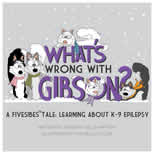Seizures, Narcolepsy, & REM
Written by: WB Thomas DVM, Dipl.ACVIM(Neurology)
Narcolepsy:
Narcolepsy is a disorder characterized by cataplexy, excessive sleepiness, and an abnormality in the phase of sleep called rapid eye movement (REM) sleep. In dogs, the most obvious sign is recurring cataleptic attacks. During a cataplectic attack, the dog suddenly collapses with paralysis of all muscles except for muscles that move the eyes and muscles responsible for breathing. The attacks are often provoked by excitement, such as feeding or play. They usually last only a few seconds, although severe episodes can last for several minutes. During a cataplectic attack, the dog is usually conscious but unable to move. During a cataplectic attack the dog may enter REM sleep. Calling to the dog or touching the dog may terminate an attack.
The association with excitement, lack of unconsciousness, lack of violent muscle movements, and rapid recovery are features of narcolepsy that help in the differentiation from epileptic seizures. Narcolepsy is a sleep disorder, not a seizure disorder. There is strong evidence that it is inherited in Doberman pinschers, Labrador retrievers, and Miniature Poodles. It occurs in other breeds of dogs as well. Narcolepsy can often be treated successfully with certain drugs, including methylphenidate and protriptyline. Anti-seizure drugs are not effective.
REM Behavior Disorder:
Some dogs have abnormally excessive, even violent movements during sleep. They may lift their head and propel themselves across the floor with running movements. They may attack inanimate objects. In contrast to a seizure, dogs can be aroused during these episodes and awake with no confusion or incoordination. This syndrome may be similar to a sleep disorder in people called REM behavior disorder. The drug clonazepam is often successful in affected dogs and people.
WB Thomas DVM
Dipl.ACVIM(Neurology)
University of Tennessee
Knoxville, TN
From the Editor:
There is now a genetic (DNA test) for suspected carriers or affected dogs as well as others within the family who are not affected. At present it is only for Dobermans, Labrador Retreivers and Dachshounds. Later, Poodles and other breeds which are believed to have the problem will be added.
Contact:
OptiGen, LLC
Cornell Business & Technology Park
767 Warren Road, Suite 300
Ithaca, NY 14850
phone: 607-257-0301
fax: 607-257-0353
email: genetest@optigen.com
web: www.optigen.com
Page last update: 12/13/2011










